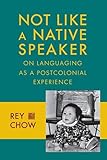Not like a native speaker : on languaging as a postcolonial experience / Rey Chow.
Material type: TextPublisher: New York : Columbia University Press, 2014Description: 1 online resource (xiv, 169 pages)Content type:
TextPublisher: New York : Columbia University Press, 2014Description: 1 online resource (xiv, 169 pages)Content type: - text
- computer
- online resource
- 9780231522717
- 0231522711
- Language acquisition -- Social aspects
- Postcolonialism -- Social aspects
- Sociolinguistics -- History
- Langage -- Acquisition -- Aspect social
- Postcolonialisme -- Aspect social
- Sociolinguistique -- Histoire
- POLITICAL SCIENCE -- Public Policy -- Cultural Policy
- SOCIAL SCIENCE -- Anthropology -- Cultural
- SOCIAL SCIENCE -- Popular Culture
- Language acquisition -- Social aspects
- Postcolonialism -- Social aspects
- Sociolinguistics
- 306.44
- P118 .C523 2014eb
- HE 150
| Item type | Home library | Collection | Call number | Materials specified | Status | Date due | Barcode | |
|---|---|---|---|---|---|---|---|---|
 Electronic-Books
Electronic-Books
|
OPJGU Sonepat- Campus | E-Books EBSCO | Available |
Although the era of European colonialism has long passed, misgivings about the inequality of the encounters between European and non-European languages persist in many parts of the postcolonial world. This unfinished state of affairs, this lingering historical experience of being caught among unequal languages, is the subject of Rey Chow''s book. A diverse group of personae, never before assembled in a similar manner, make their appearances in the various chapters: the young mulatto happening upon a photograph about skin color in a popular magazine; the man from Martinique hearing himself named "Negro" in public in France; call center agents in India trained to Americanize their accents while speaking with customers; the Algerian Jewish philosopher reflecting on his relation to the French language; African intellectuals debating the pros and cons of using English for purposes of creative writing; the translator acting by turns as a traitor and as a mourner in the course of cross-cultural exchange; Cantonese-speaking writers of Chinese contemplating the politics of food consumption; radio drama workers straddling the forms of traditional storytelling and mediatized sound broadcast. In these riveting scenes of speaking and writing imbricated with race, pigmentation, and class demarcations, Chow suggests, postcolonial languaging becomes, de facto, an order of biopolitics. The native speaker, the fulcrum figure often accorded a transcendent status, is realigned here as the repository of illusory linguistic origins and unities. By inserting British and post-British Hong Kong (the city where she grew up) into the languaging controversies that tend to be pursued in Francophone (and occasionally Anglophone) deliberations, and by sketching the fraught situations faced by those coping with the specifics of using Chinese while negotiating with English, Chow not only redefines the geopolitical boundaries of postcolonial inquiry but also demonstrates how such inquiry must articulate historical experience to the habits, practices, affects, and imaginaries based in sounds and scripts.
Introduction: Skin Tones-About Language Postcoloniality, and Racialization -- Derrida''s Legacy of the Monolingual -- Not Like a Native Speaker: The Postcolonial Scene of Languaging and the Proximity of the Xenophone -- Translator, Traitor; Translator, Mourner (or, Dreaming of Intercultural Equivalence) -- Thinking With Food, Writing Off Center: The Postcolonial Work of Leung Ping-Kwan and MA Kwok-Ming -- The Sounds and Scripts of a Hong Kong Childhood.
Includes bibliographical references and index.
Print version record.
In English.
eBooks on EBSCOhost EBSCO eBook Subscription Academic Collection - Worldwide
There are no comments on this title.

